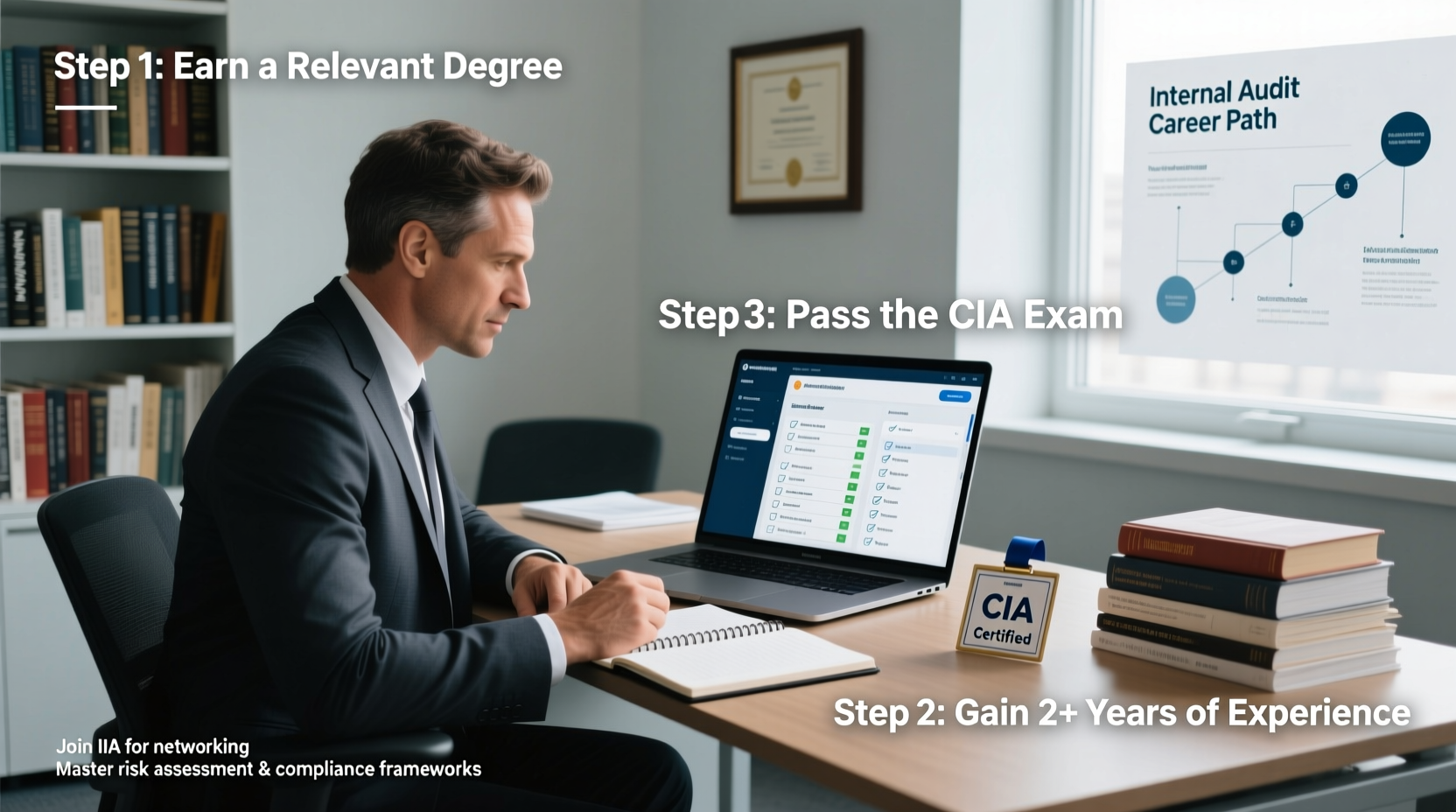Becoming a Certified Internal Auditor (CIA) is one of the most respected credentials in the field of auditing and corporate governance. The designation, awarded by The Institute of Internal Auditors (IIA), signals expertise in risk management, compliance, financial controls, and ethical standards. Whether you're starting your career in accounting or looking to transition into internal audit, earning the CIA certification can open doors to leadership roles, higher salaries, and global opportunities.
This comprehensive guide walks you through every stage of the journey—understanding eligibility, preparing for the exams, building essential skills, and advancing your career with real-world strategies.
Understand the CIA Certification and Its Value

The CIA credential is globally recognized and often required or preferred by employers in sectors such as finance, healthcare, government, and multinational corporations. It demonstrates mastery of internal audit principles, including risk assessment, control frameworks, fraud detection, and regulatory compliance.
Holders of the CIA designation typically see a 20–35% increase in earning potential compared to non-certified peers, according to IIA salary surveys. Additionally, the certification enhances credibility when advising executive teams and board members.
“Earning the CIA was the turning point in my career. It gave me the technical foundation and confidence to lead audits across multiple industries.” — Daniel Reeves, Senior Audit Manager, Financial Services
Step-by-Step Path to Becoming a Certified Internal Auditor
Follow this structured timeline to earn your CIA designation efficiently and effectively.
- Evaluate Your Eligibility: You must meet one of the following educational paths:
- Bachelor’s degree or equivalent from an accredited institution
- Two years of internal auditing experience at the supervisory level or higher
- Alternatively, a combination of education and relevant work experience may qualify under IIA’s flexible criteria
- Apply Through the IIA: Submit your application online via the IIA Global Certification Portal. Include transcripts, proof of employment, and pay the application fee (~$145 USD).
- Receive Approval and Scheduling Permit: Once approved (typically within 2–4 weeks), you’ll get access to schedule your exam parts.
- Prepare for the Three Exam Parts: Each part covers distinct domains. Allocate 2–4 months per section depending on background.
- Sit for and Pass All Three Exams: Exams are computer-based, offered year-round at Pearson VUE centers.
- Submit Work Experience Verification: After passing all exams, provide two professional references and supervisor verification of 24 months of relevant experience.
- Earn Your Credential: Upon approval, you become a fully certified CIA and gain use of the designation.
Breakdown of the CIA Exam Structure and Content
The CIA exam consists of three parts, each focusing on core competencies. All questions are multiple-choice, with some requiring case analysis.
| Exam Part | Focus Areas | Number of Questions | Time Allowed |
|---|---|---|---|
| Part 1: Essentials of Internal Auditing | Audit standards, ethics, risk concepts, governance, and engagement planning | 125 | 150 minutes |
| Part 2: Practice of Internal Auditing | Engagement tools, data analytics, sampling, reporting, and communication | 100 | 120 minutes |
| Part 3: Business Knowledge for Internal Auditing | Financial management, IT systems, cybersecurity, performance measurement, and business acumen | 100 | 120 minutes |
Each section requires deep conceptual understanding and practical application. For example, Part 3 increasingly emphasizes technology risks, including cloud infrastructure and AI-driven controls.
Essential Skills Beyond the Exam
Passing the CIA exams proves technical knowledge, but long-term success demands broader capabilities. Employers seek auditors who combine analytical rigor with interpersonal effectiveness.
- Critical Thinking: Ability to assess complex processes and identify control gaps without bias.
- Communication Skills: Must clearly articulate findings to both technical teams and non-financial executives.
- Data Analytics Proficiency: Familiarity with tools like ACL, IDEA, Power BI, or Excel pivot tables is now standard.
- Emotional Intelligence: Delivering critical feedback tactfully builds trust and encourages corrective action.
- Project Management: Managing timelines, resources, and stakeholder expectations during audit cycles.
Checklist: Preparing for the CIA Exams
Use this actionable checklist to stay on track during preparation.
- ☐ Confirm eligibility and submit IIA application
- ☐ Choose a study provider (Gleim, Hock, or Surgent are top-rated)
- ☐ Create a study calendar (minimum 100–120 hours per part)
- ☐ Take diagnostic quizzes to identify weak areas
- ✍️ ☐ Schedule exam dates 8–10 weeks in advance
- 📚 ☐ Complete at least two full practice tests per part
- 🔁 ☐ Review incorrect answers and understand reasoning
- 🧘 ☐ Practice timed sessions to build endurance
Real-World Example: From Accountant to CIA
Maria Tan worked as a staff accountant at a mid-sized manufacturing firm for three years. Interested in moving beyond transactional tasks, she explored internal audit roles internally. Her manager encouraged her to pursue the CIA after noting her attention to detail and process improvement ideas.
Maria began studying while working full-time, dedicating 10–12 hours weekly over six months. She passed Part 1 on her first attempt, struggled slightly with IT concepts in Part 3, but used targeted video tutorials to improve. After passing all exams, she submitted her work experience and earned her certification.
Within a year, Maria was promoted to Internal Audit Associate and now leads supplier compliance reviews. “The CIA didn’t just give me a title—it gave me the framework to think like a strategic advisor,” she says.
Career Advancement Tips After Certification
Earning the CIA is not the finish line—it’s a launchpad. Use it strategically to grow professionally.
- Pursue Specializations: Consider additional credentials like CRMA (Certification in Risk Management Assurance) or CISA (for IT audit focus).
- Join Local IIA Chapters: Attend networking events and volunteer for committees to build industry connections.
- Seek Mentorship: Connect with senior CIAs for guidance on career moves and skill development.
- Negotiate Salary Post-Certification: Present your new credential during performance reviews to justify raises or promotions.
- Stay Current: Maintain 40 hours of continuing professional education (CPE) annually as required by IIA.
“The best auditors aren’t just rule-checkers—they’re change agents who help organizations operate better.” — Lila Chen, Chief Audit Executive
Frequently Asked Questions
How long does it take to become a CIA?
Most candidates complete the process in 12 to 18 months, depending on study pace and experience verification timing. Some finish faster if they already meet work requirements.
Can I take the CIA exams before meeting the experience requirement?
Yes. The IIA allows candidates to sit for exams before fulfilling work experience. However, you won’t receive the official designation until experience is verified.
Is the CIA recognized outside the U.S.?
Absolutely. The CIA is accepted in over 170 countries and is often a requirement for audit roles in multinational firms and international organizations like the World Bank or UN agencies.
Final Steps: Launch Your Internal Audit Career
Becoming a Certified Internal Auditor is more than earning a certificate—it's about transforming how you view business operations, risk, and integrity. With structured preparation, disciplined study habits, and a commitment to continuous learning, you can pass the exams and thrive in a dynamic, impactful profession.
Start today: review your eligibility, choose a study plan, and set your first exam date. Every leading auditor once stood where you are now—ready to take the first step.









 浙公网安备
33010002000092号
浙公网安备
33010002000092号 浙B2-20120091-4
浙B2-20120091-4
Comments
No comments yet. Why don't you start the discussion?